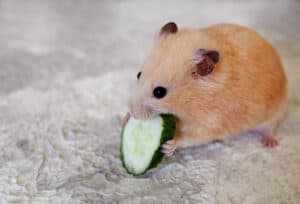Can hamsters eat tomatoes? In this article, we’ll explore the answer to this question and more. Learn whether or not it’s safe for your furry friend to enjoy the occasional tomato.
Can Adult Hamsters Eat Tomatoes?
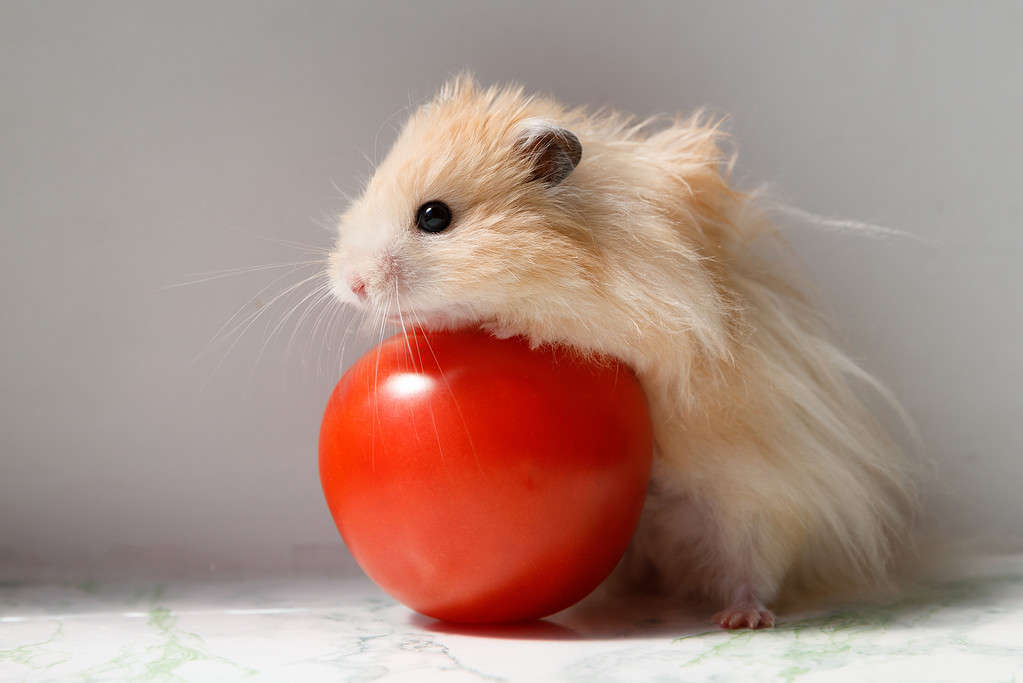
Tomatoes are safe for hamsters in extreme moderation. 1/2 a teaspoon, no more than twice per week.
©Vladimir18/iStock via Getty Images
Yes, adult hamsters can eat tomatoes. You can feed them small pieces of ripe, washed tomato once or twice per week. Watch your pet carefully for 24 hours after you feed them tomatoes in case they have an adverse reaction. Most veterinarians recommend that you feed your hamster organic veggies and fruits, as herbicides and pesticides have detrimental effects on such tiny animals.
The truth is, there are much healthier foods that you can choose to feed your hamster. Tomatoes are not ideal for hamsters, but they will not harm them if you use extreme moderation.
Can Baby Hamsters Eat Tomatoes?
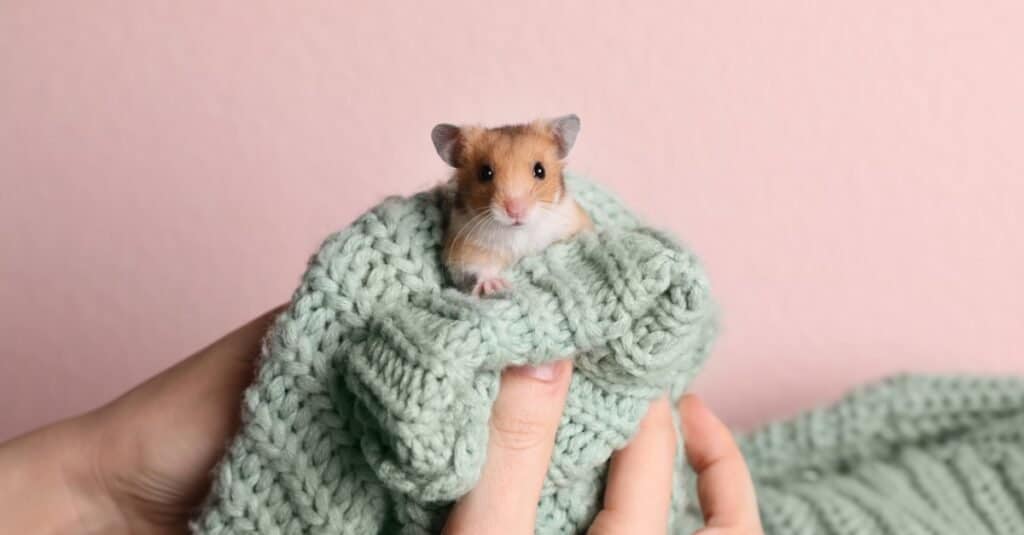
Do not feed baby hamsters any fruit or vegetables (including tomato) until they are 4 months old.
©iStock.com/Liudmila Chernetska
Adult hamsters have fully developed gastrointestinal systems. Young hamsters are more sensitive, especially to acidic foods like tomatoes. You should not feed baby hamsters vegetables or fruits (including tomatoes) until they are over 4 months old. After that, slowly introduce the juiciest types of fruits in tiny amounts. Watch them carefully for 24 hours after they eat the new food to see how they react.
How to Feed Hamsters Tomatoes Safely
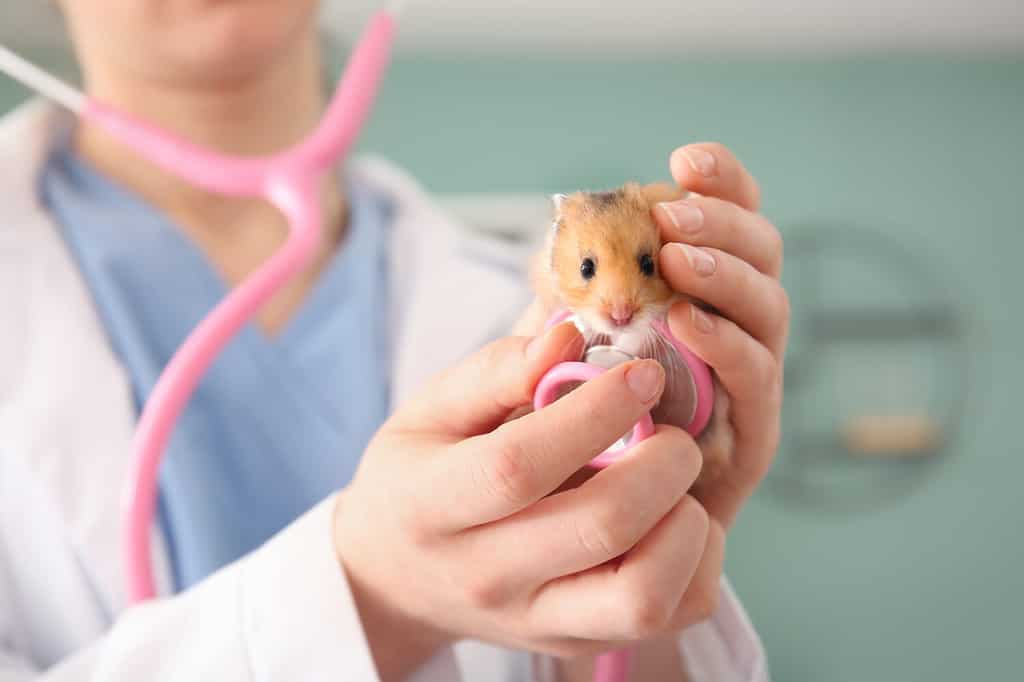
Ask your veterinarian before introducing any new food to your pet hamster.
©Pixel-Shot/Shutterstock.com
First, choose organic produce. Thoroughly wash the tomato and cut it into half-inch pieces. Give the hamster only one of these pieces. Alternatively, you can give your hamster half of a tiny cherry tomato. The quantity of tomato that is safe for hamsters equals one-half of a teaspoon twice per week! We weren’t kidding when we said extreme moderation is the key to hamsters eating tomatoes.
Be sure to feed tomatoes to a hamster only once or twice per week, as too much acidic food is not good for them in larger quantities. In the case of tomatoes, tiny amounts are good, and anything larger than that is toxic.
Dangerous Parts of Tomatoes for Hamsters
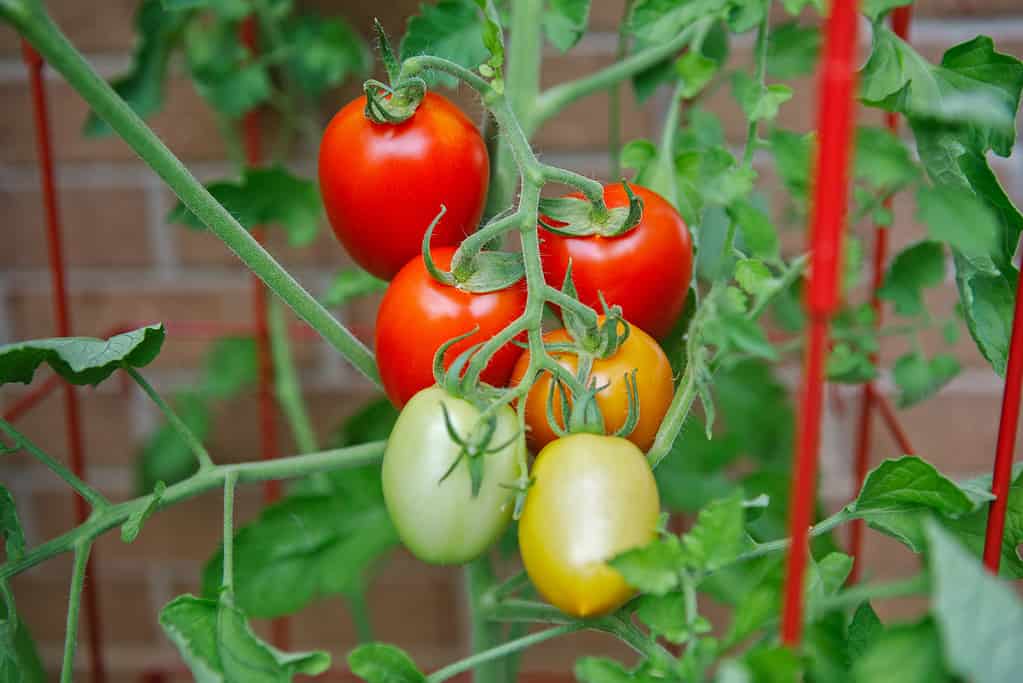
Any green part of a tomato plant, including green tomatoes themselves, is highly toxic to hamsters.
©eurobanks/iStock via Getty Images
Feed your hamster the red, ripe flesh of the tomato and the skin. Do not feed a hamster the stem, leaves, vine, or seeds of a tomato. A green, unripe tomato is also inappropriate to feed to a hamster. The green and leafy parts of tomato plants contain solanine, which is toxic to hamsters.
Additionally, beware of chemicals and pesticides on the tomato. If you are buying your tomatoes from a grocery store, make sure to thoroughly wash them before feeding them to your hamster. This will help reduce any potential chemical or pesticide exposure.
Also, it is best to avoid canned tomatoes as they often contain additives and preservatives that can be harmful to hamsters. When in doubt, stick with fresh organic produce!
Hamsters cannot eat tomato sauce, tomato soup, or tomato juice. Processed tomato products are full of salt, sugar, and other additives. They are too concentrated and contain much higher acidity than fresh tomatoes.
Can Hamsters Eat Tomatoes—Nutritional Value
Tomatoes are an excellent source of nutrition for hamsters, providing important vitamins and minerals. They are a great source of vitamin A, which helps to maintain healthy vision and skin. Tomatoes also contain vitamin C, which helps fight off infections and boosts immunity. Additionally, they are a good source of dietary fiber, which helps keep the digestive system functioning properly.
Tomatoes also contain important minerals such as potassium, which helps keep the heart healthy, and magnesium, which helps the body to produce energy. Furthermore, tomatoes have lycopene, a powerful antioxidant that helps to reduce inflammation and protect cells from damage.
The Effects of Overfeeding Tomatoes on Hamsters
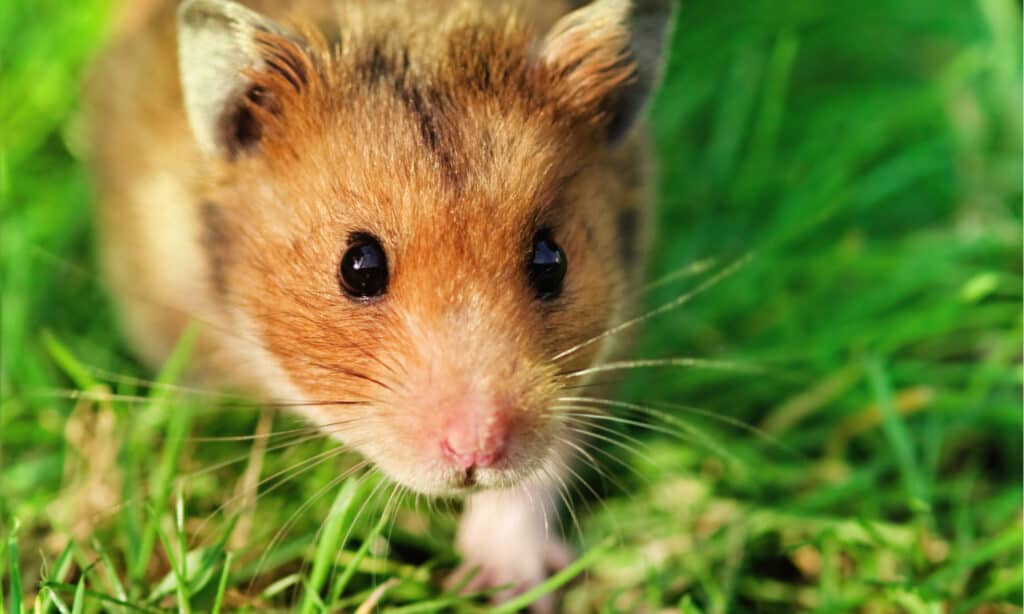
The most serious side effect of overfeeding tomatoes to hamsters is death.
©VeryOlive/Shutterstock.com
Overfeeding tomatoes to hamsters can have some detrimental effects on their health. Hamsters are prone to obesity when they are overfed, and tomatoes are high in sugar, which can contribute to weight gain. Additionally, too much sugar can cause dehydration, as the body will excrete more water than it takes in, leading to health problems.
Hamsters also have sensitive digestive systems. Too much tomato can cause digestive issues. They may experience vomiting, diarrhea, or constipation, all of which can be very uncomfortable. Overfeeding tomatoes can also lead to an unbalanced diet, as hamsters need a variety of foods to remain healthy.
Tomatoes can also be toxic to hamsters if they are overfed, as they contain solanine, a natural toxin. This toxin can cause serious health problems, including organ damage and even death.
It’s important to ensure that hamsters don’t get too much tomato in their diet. Giving them small amounts as treats is fine, but they should not be fed large portions of tomatoes on a regular basis. It’s also important to make sure that they are getting a balanced diet with plenty of fresh vegetables and other nutritious foods. This will help keep them healthy and happy.
The Importance of Variety in a Hamster’s Diet
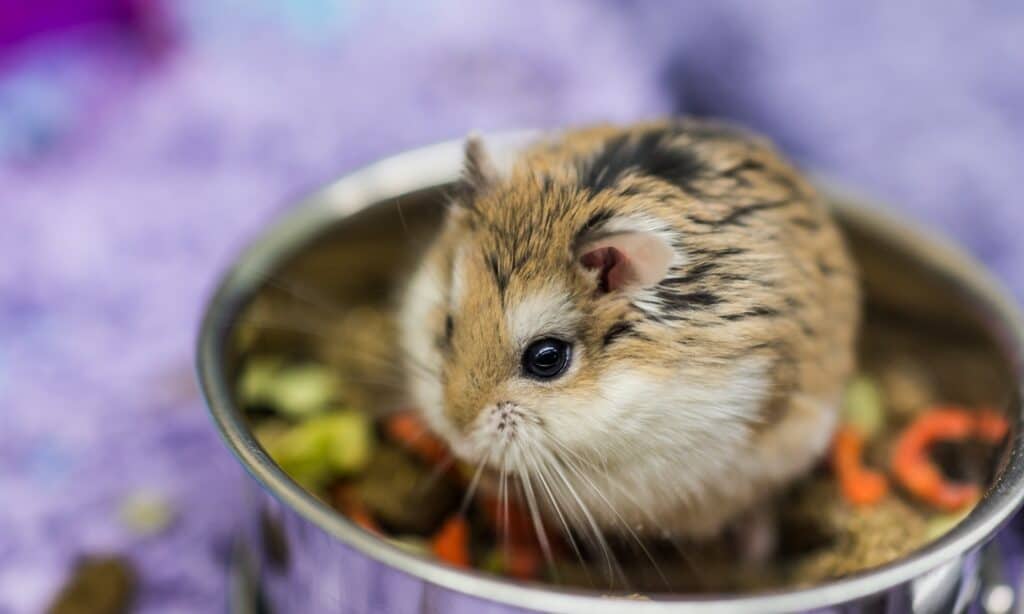
In the wild, hamsters are omnivores who eat a wide range of different foods.
©iStock.com/krblokhin
A healthy diet is essential for all animals, including hamsters. To ensure their physical and mental well-being, it is important to provide them with a variety of food that meets their nutritional needs.
A hamster’s diet should include a mix of fresh fruits and vegetables, along with a variety of seeds, nuts, and grains. This will provide them with the vitamins, minerals, and fiber they need to stay healthy. It is also important to provide variety in the types of food they are eating to ensure they get all the nutrition they need.
In addition to variety in the types of food, it is important to provide variety in how it is served. For example, try feeding them fresh fruits and vegetables some days and then offering them a variety of cooked or raw meats and grains on other days. This will give them a wide range of flavors and textures to explore and enjoy.
It is also important to provide variety in how the food is presented. Try offering different shapes, sizes, and colors of food to encourage their natural foraging instincts and to keep them engaged and excited about their meals.
Toxic Foods for Hamsters

Protect your much-loved pet by thoroughly researching new foods and not taking any chances.
©meawtai/ via Getty Images
Hamsters are small, adorable creatures that make great pets. However, there are certain foods that can be toxic for them if ingested, such as blue cheese, chili peppers, eggplant, uncooked kidney beans, deli meats, raw potatoes, and rhubarb leaves. Therefore, it is important to be aware of what foods are safe and dangerous for your pet hamster.
Blue cheese can be toxic for hamsters because it contains a high level of salt, which can cause kidney damage and even death. Chili peppers contain capsaicin, which can result in gastrointestinal distress. Eggplant is high in oxalates, which can cause bladder stones. Uncooked kidney beans contain phytohemagglutinin, which can cause red blood cell destruction if consumed in large quantities. Deli meats are processed and contain high levels of sodium and fat, which can cause obesity and diabetes in hamsters. Raw potatoes contain solanine, which can cause gastrointestinal distress if eaten in large amounts. Lastly, rhubarb leaves contain oxalic acid, which can cause kidney stones.
It is important to remember that while variety in the types of food your hamster eats is important to keep them healthy, it’s just as important to make sure they are not eating anything that could be potentially harmful or toxic. Make sure you research any new type of food before introducing it to your beloved companion.
The Ideal Hamster Diet
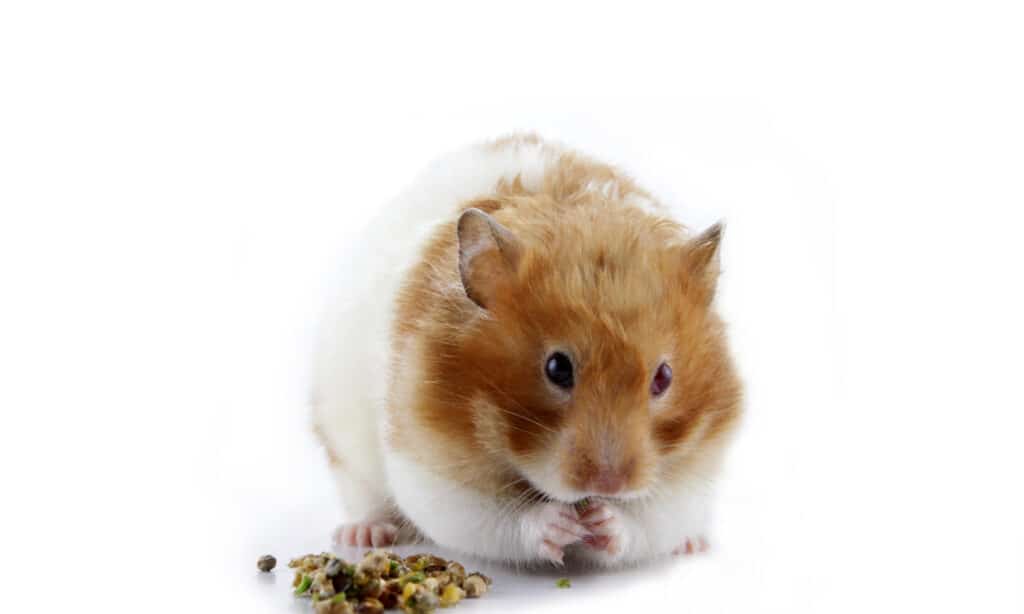
Hamsters eat tomatoes, but only in tiny amounts, and never the green parts.
©Adrin Shamsudin/Shutterstock.com
Hamsters are omnivores, meaning that they eat a combination of plants and insects in the wild. To provide them with a healthy diet, it’s important to give them food similar to what they would eat in the wild, such as fresh vegetables, proteins, and treats like mealworms.
Hamsters also like to store their food in special cheek pouches and around their cage. Avoid muesli-style mixes when selecting food for your hamster, which can lead to dental issues and weight gain. Hamster diets should include commercial hamster pellets, small amounts of fresh fruit, vegetables, and herbs, Timothy hay, and occasional treats like nuts, boiled eggs, or mealworms. Always make sure they have access to clean water as well.
The photo featured at the top of this post is © mu_mu_/iStock via Getty Images
Thank you for reading! Have some feedback for us? Contact the AZ Animals editorial team.





